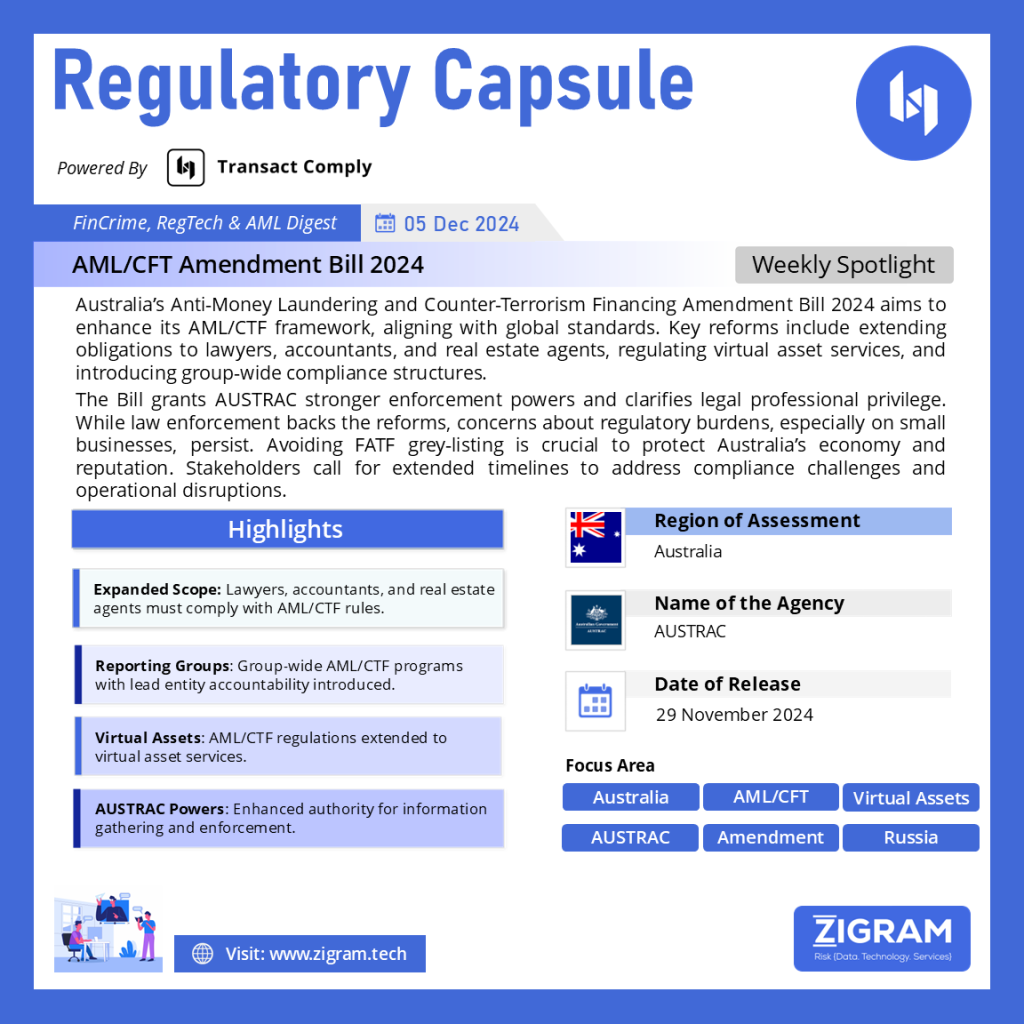Regulation Name: Anti Money Laundering and Counter Terrorism Financing Amendment Bill 2024
Publishing Date: 29 November 2024
Region: Australia
Agencies: AUSTRAC
In an effort to strengthen its financial system and adhere to global standards, Australia has proposed significant amendments to its Anti-Money Laundering and Counter-Terrorism Financing Act 2006 (AML/CTF Act) through the Anti-Money Laundering and Counter-Terrorism Financing Amendment Bill 2024. The Bill reflects Australia’s commitment to addressing financial crimes, enhancing transparency, and maintaining its economic reputation in the global arena.
Key Reforms and Objectives
The Bill, introduced to Parliament in September 2024, introduces sweeping reforms across multiple sectors. Its primary aim is to update Australia’s AML/CTF framework in alignment with recommendations from the Financial Action Task Force (FATF) and address vulnerabilities in existing legislation. Key reforms include:
1. Expansion of Reporting Obligations:
o Professionals such as lawyers, accountants, real estate agents, and dealers in precious metals and stones will now fall under AML/CTF obligations.
o These additions, known as tranche two entities, aim to close loopholes exploited for money laundering and terrorism financing.
2. New Reporting Group Framework:
o Entities within a defined group will be required to implement group-wide AML/CTF programs, with a lead entity overseeing compliance.
o This structure enhances accountability and standardizes compliance processes.
3. Customer Due Diligence (CDD):
o Strengthened CDD requirements mandate thorough verification of customer identities before providing services, ensuring better risk management.
4. Regulation of Virtual Assets:
o Extending AML/CTF regulations to cover virtual asset services addresses the growing risk of financial crimes in the digital economy.
5. Enhanced Legal Professional Privilege Provisions:
o Clearer guidelines protect privileged communications while ensuring reporting entities meet their obligations without undermining client confidentiality.
6. Introduction of Coercive Powers:
o AUSTRAC, the financial intelligence agency, gains new powers to demand information and conduct examinations, bolstering enforcement capabilities.
7. Transition Provisions:
o A “Henry VIII clause” allows the government to modify transitional arrangements through legislative instruments, ensuring a smoother implementation of reforms.
Stakeholder Reactions
The Bill has elicited mixed reactions from stakeholders:
• Support for Reform:
o Law enforcement agencies and AUSTRAC welcome the reforms as vital to combating sophisticated financial crimes. Enhanced regulations for tranche two entities are viewed as critical for addressing long-standing gaps.
• Concerns Over Regulatory Burden:
o Small businesses, particularly in the legal and real estate sectors, have raised concerns about the cost and complexity of compliance.
o Financial institutions have highlighted potential operational disruptions, particularly regarding the tightened CDD requirements.
• Need for Clarifications:
o Professional associations such as the Australian Bar Association and the Law Council of Australia emphasize the importance of precise language to avoid overburdening certain professions, such as barristers.
Economic and Global Implications
Failure to implement these reforms could lead to Australia being placed on the FATF “grey list,” subjecting the country to increased scrutiny and potential reputational damage. Research indicates grey-listing could result in a GDP decline of up to 7.6% and a reduction in foreign direct investment by 3%.
Implementation Challenges
The reforms are slated to commence in stages by 2026, with provisions for a phased rollout. However, stakeholders have called for extended timelines to accommodate the development of operational frameworks and compliance infrastructure.
Conclusion
The Anti-Money Laundering and Counter-Terrorism Financing Amendment Bill 2024 represents a critical juncture for Australia’s financial regulatory landscape. While its ambitious scope has garnered support from enforcement agencies, addressing industry concerns will be pivotal to ensuring its successful implementation. As Australia prepares for its next FATF evaluation in 2026–2027, these reforms will be instrumental in safeguarding its financial integrity and global standing.
Read the details here.
Read about the product: Transact Comply
Empower your organization with ZIGRAM’s integrated RegTech solutions – Book a Demo
- #AMLReforms
- #CounterTerrorismFinance
- #FinancialTransparency
- #AUSTRAC
- #AntiMoneyLaundering
- #TrancheTwoEntities
- #VirtualAssets
- #FinancialCrime
- #Compliance
- #RegulatoryReforms
